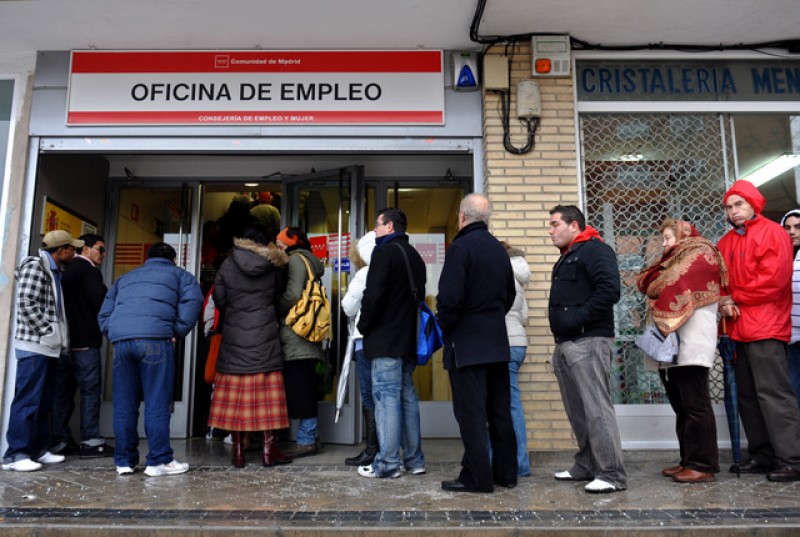- Region
- Vega baja
- Marina Alta
- Marina Baixa
- Alicante
- Baix Vinalopo
- Alto & Mitja Vinalopo
-
ALL TOWNS
- ALICANTE TOWNS
- Albatera
- Alfaz Del Pi
- Alicante City
- Alcoy
- Almoradi
- Benitatxell
- Bigastro
- Benferri
- Benidorm
- Calosa de Segura
- Calpe
- Catral
- Costa Blanca
- Cox
- Daya Vieja
- Denia
- Elche
- Elda
- Granja de Rocamora
- Guardamar del Segura
- Jacarilla
- Los Montesinos
- Orihuela
- Pedreguer
- Pilar de Horadada
- Playa Flamenca
- Quesada
- Rafal
- Redovan
- Rojales
- San Isidro
- Torrevieja
- Comunidad Valenciana
Sources of information and possible help for anyone unemployed in Spain
A brief guide to obtaining benefits and help should you need them
Needing to work to make a living in a foreign country means navigating your way through unfamiliar bureaucracy in a different language. Knowing the basics of how the system works is a good starting point.
And, whilst the welfare system can be difficult to navigate help is available if you are legally resident and know where to look.
The Covid pandemic has certainly caused significant problems for many people who formerly ran their own businesses or were employed before the crisis and are now finding it difficult to either claim unemployment benefit or have exhausted their unemployment benefit entitlement.
Working legally
Holders of a passport from an EU member country can enter Spain freely and apply for residency after three months. Once resident they may seek employment.
UK passport holders legally resident in Spain before 1 January 2021 have the right to work, as long as they remain legally resident. Anyone arriving from the UK after that date is considered to be from a non-EU country.
Citizens from a non-EU country, which now includes the UK, will need to have a job offer before they can apply for a work and a residence permit. Those planning to start a business or to become self-employed will need to provide a business plan and proof of sufficient funds etc. Detailed information regarding the application process can be found on the website of the Spanish Consulate in London.
http://www.exteriores.gob.es/Consulados/LONDRES/en/Consulado/Pages/Visas.aspx
Once legally working in Spain foreigners will be subject to the same labour legislation as any Spanish worker and will be entitled to the same benefits, both during the time they are working and in the eventuality that they become unemployed.
Your employment contract
It is important to play close attention to the employment contract to avoid problems further down the line. In Spain an employment contract must identify the employee, the employer, the type of work contract (indefinite/temporary), the salary, the hours etc. The employee is entitled to a copy of the contract signed by the Spanish Employment Service (SEPE) so that they know that everything is above board.
More information about work contracts is available in English from the Public Employment Service (SEPE) https://www.sepe.es/HomeSepe/en/empresas/Contratos-de-trabajo/modelos-contrato.html
Social Security payments
Every employee, whether self-employed or an employee of a company, is obliged to contribute to the Spanish Social Security system by paying taxes from their salary. The deductions are calculated and taken by the employer or by Social Security if self-employed. A portion of the amount taken is for your unemployment benefits should you need them. The amount paid varies depending on several factors; whether you are self-employed, a company director, your age etc. It is highly advisable to contract an accountant to handle your tax affairs who can give the best advice if embarking on opening a business or planning a new life in Spain as there are various schemes available which lower the initial Social Security payments in certain circumstances.
Even if you were formerly employed and do not have your own accountant, ask your former employer for the details of their accountant and ask them to explain what your rights are.
Unemployment Benefits (contributory)
In order to be considered for unemployment benefits you must have been in employment and made Social Security contributions for at least 12 months in the last six years. You must also be under retirement age and not subject to any form of incompatibility.
The amount received as unemployment benefit is established according to the average salary for which you have made contributions (not counting overtime) during the 6 months prior to becoming unemployed. During the first 180 days of unemployment, you will receive 70% of that average and then 50%. Minimum limits based on a multiplier of the Public Income Index (IPREM) are applied and the minimum is higher if you have dependent children.
Your right to employment benefits can be suspended if you are found to be working for someone else or being self-employed whilst claiming benefit. Your benefit will also be suspended for rejecting a job, failing to participate in employment schemes, training schemes, social collaboration work or anything else that the employment offices requires you to do. Failure to sign on with the employment office as and when required will also result in suspension of payments.
Click for employment offices in Spain: SEPE offices finder
More detailed information is available in English from the Spanish Employment Service. The translation is not great and you are better off reading the Spanish version if you can.
https://www.sepe.es/HomeSepe/en/Personas/distributiva-prestaciones/quiero-cobrar-el-paro/he-trabajado-mas-de-un-ano.html
Unemployment Subsidies (non contributory)
If you do not qualify for unemployment benefit you may qualify for an unemployment subsidy which is means tested. This subsidy is for people who have lost their job involuntarily, have an income of less than 75% the National Minimum Wage and have paid contributions from 180 to 359 days or have paid contributions from 90 to 179 days and have family responsibilities.
Special subsidies are also available for those over 52 years of age.
More detailed information about subsidies is available in English from the Spanish Employment Service. Again, the translation is not great.
Minimum Income for Social Inclusion (Renta Mínima de Inserción Social)
Those who have consumed all available unemployment benefits and subsidies and are left with insufficient resources to live may qualify for the Renta Mínima de Inserción Social or Minimum Income for Social Inclusion.
The benefit is administered by each autonomous region and is means tested. Applicants must be between 25 and 65 years old and actively seeking employment.
The government of Andalusia provides information on its website which includes a simulator to check if you qualify. Applications can be made online or by going to the nearest Social Security Office or Centro Servicios Sociales Comunitarios.
Priority is given to the processing of urgent applications when there is an issue of domestic violence, sexual exploitation, eviction notices, mortgage foreclosures, homelessness or grave illness.
Minimum Income (Ingreso Minimo Vital)
In 2020 the central government of Spain introduced the Ingreso Minimo Vital (IMV) or Minimum Income and it is means tested.
Applicants must be between 23 and 65 years or may be 18 or over if they have dependent children, be legally resident in Spain for a year and in a situation of economic vulnerability having failed to obtain benefits in other ways. Again, applicants must be actively seeking employment. Applications can be made on line or by going to the nearest Social Security Office.
More information can be found on the website of the Ministry for Inclusion and Social Services. The English text is not yet available.
Getting help with the bureaucracy
Administrative procedures can be incredibly complex and you are likely to need experienced assistance in order to navigate the system even if you do speak Spanish. Many Spanish people use the services of a Gestor for this reason. A Gestor is a service office who are experts on Spanish bureaucracy and regulations and can help with legal advice for issues you may encounter when living in Spain. It is not difficult to find an English-speaking Gestor and they are usually cheaper than a lawyer.
It cannot be stressed sufficiently that using the services of professionals such as a Gestor or an accountant is vital to help novices navigate the Spanish system. There IS HELP AVAILABLE for those who find themselves in a difficult situation, particularly in light of the Covid pandemic, but it is essential to seek it in the right place and to ask people who speak Spanish and know the system.
Many international residents fail to secure the help available to them because they don´t ask the right people for information or spend the time trying to understand how the system works; a Gestor will help and although they require payment, can be a lifeline. Don´t rely on “some bloke on facebook”; ask for professional help and understand that the emphasis is very much on the individual to find out for themselves in Spain, as it is in navigating most bureaucratic processes here.
Other benefits and assistance
You may be eligible to receive benefits from your home country. UK citizens can check their eligibility via the UK government website https://www.gov.uk/uk-benefits-abroad/
You may be eligible to receive other benefits in Spain. More information is available in English on the website of the Ministry of Inclusion, Social Security and Migration http://www.seg-social.es/wps/portal/wss/internet/InformacionUtil/44539/
The local Town Hall / council office is the normal gateway to Spanish statutory social care. To apply for statutory social care a foreign national must normally have been resident in Spain for 5 years in total and continuously for the last two years and must have registered with the town hall as a resident and be in possession of pádron. The level of support that you will get from your town hall varies and depends on the resources available. It can be a bit ad hoc and often impossible to navigate if you do not speak Spanish.
Food banks
FESBAL, the national federation of foodbanks (bancos de alimentos) has contact points located throughout the country. The volunteers at these contact points will assess any requests for assistance and will advise you regarding next steps to obtain food from your nearest food bank. There is a locator map and contact details on their website: https://www.fesbal.org.es/contacto
Food from foodbanks is normally distributed via local charities, such as Cáritas, in collaboration with local town halls or Protección Civíl. It is well worth asking via the local town hall where the most appropriate local point of contact is and also worth offering to help out with the local charities if you yourself require help.
CARITAS is a social action entity of the Catholic church in Spain and it operates via a network of some 5,597 church parishes throughout Spain. Their website contains a locator map and contact details of local branches. https://www.caritas.es/te-ayudamos-apoyo/
Do not expect any of these organisations to speak English.
International charities
It is also well worth talking to local charities run by expat organisations if you need help. Many of these local charities work within the expat community in close collaboration with local Spanish charities, raising money to donate to local good causes and have built up a great deal of local goodwill as well as many local contacts. Even if they are unable to provide food or financial support, they will frequently offer practical help, contacts, information and support and may be able to put you in touch with organisations that can help.






